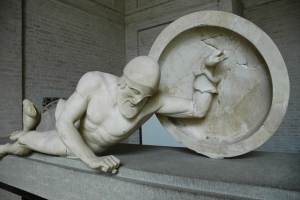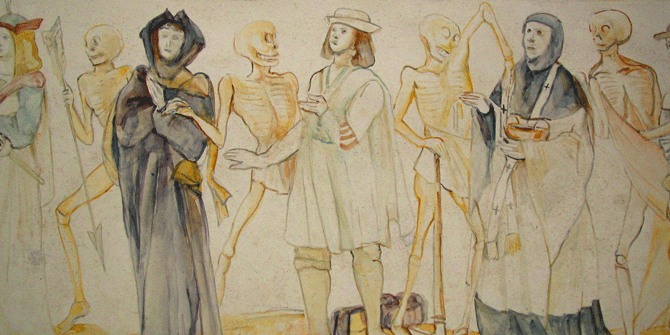In the second part of this series, Luc Bovens looks at a good death and a future without oneself.
In Part 1 we examined a first type of secular hope – the hope that one has lived a worthwhile life. In this second part, we will look at two different secular hopes – the hope to die well and the hope that the future will be well.
Dying well
Aristotle’s Death on the Battlefield
The hope that one’s life was worthwhile, that one has lived well, is mirrored in a hope that one will die well. What is it to die well? We all hope not to die a painful and agonising death but that’s a problem for experts in palliative care and pain management rather than philosophers. Aristotle has some views on dying well. Death on the battlefield, for him, is the most desirable death, it is a proper ending to a happy life. Death caused by disease or death as a passenger on a sinking ship are unenviable deaths. Why does Aristotle think this?
First, on the battlefield one can show off one’s courage and skills and this is desirable because we like to die in a way that is reflective of the ideals that we hold dear and the skills that we have honed over our life-time. One can do no such thing when one battles a terminal disease or is a passenger on a sinking ship. Aristotle even makes an exception for a sailor – for a sailor, death at sea is a worthy death since a sailor can show off his skills in trying to save the boat.
Second, Aristotle considers death on the battlefield to be a noble death. I take him to mean that when dying on the battlefield we do not die in vain – our death serves some greater cause.

“For Aristotle, death on the battlefield is the most desirable death.”
So-called “Dying warrior” (fallen Trojan warrior, probably Laomedon), figure E-XI of the east pediment of the Temple of Aphaia, ca. 505–500
[CC BY 2.5, GFDL or CC-BY-SA-3.0, via Wikimedia Commons]
Dying as one has lived
When there is a fatal accident in sports, loved ones find consolation in assuring themselves that the athlete died doing what he liked best. A Muslim relative of mine faced protests from her family because she wanted to go on another Hajj at an advanced age and in poor health. She responded, “Could there be any sweeter way to leave this earth?” John Updike rested his head on the typewriter because he was too weak to type up his final poems on dying before he found the strength to do so. In all of these cases people died or faced death doing what they were good at, what they enjoyed or what defined them throughout their lives. Loved ones find consolation in this, people themselves find the prospect of such a death less objectionable and they may even hope to die this way.
People also hope to die in circumstances or at a time that is reflective of what they value in life or that is symbolic of something that they stand for or identify with. This can take many forms: They hope to die surrounded by their families or in the comfort of their homes. They hope to die, say, on Independence Day or a particular Saint’s Day.
Mark Twain was born in the year of Halley’s Comet and hoped to die in the year of its return. He wrote in 1909, the year before Halley’s return, that it would be “the greatest disappointment of my life if I don’t go out with Halley’s Comet. The Almighty has said, no doubt: ‘Now here are these two unaccountable freaks; they came in together, they must go out together.’ Oh! I am looking forward to that.” His hopes were met when he died in 1910 due to heart failure. Mark Twain was a great storyteller and he saw dying in the year of the return of Halley’s Comet as a way to give the world another story.
Not to Die in Vain
The comedian Tony Hancock joked: “Does Magna Carta mean nothing to you? Did she die in vain?” Humour aside, soldiers in war and revolutionaries indeed hope that their untimely deaths will advance the war effort. Relatives of deceased soldiers find it very hard to accept that the war shouldn’t have been fought. “A woman protested saying: ‘Of course it was a righteous war. My son fell in it,’” Kahlil Gibran writes. Terminally ill patients participate in randomised controlled trials for experimental drugs and hope that at least their participation will contribute to the advancement of science. In all these cases, people would like their deaths to be good for something.
Aristotle’s enthusiasm for death on the battlefield may seem foreign to us, but his reasons for favouring it are not. The two reasons, hoping to die in ways that reflect our lives and hoping that our deaths may do some good, are still relevant today. In particular, they also feature in the contemporary debate on euthanasia.
Euthanasia
Proponents of euthanasia hinge their case on the fact that patients should have the opportunity to die in a way that is reflective of what they stand for in life. If what they stand for is independence, control and autonomous agency then they may consider euthanasia to be the most fitting death for them when they are afflicted by a debilitating disease. They do not want to see their bodies helplessly deteriorate further. They do not want to be dependent on a regimen of painkillers for pain control. They do not want to see themselves as being dependent on care-givers. They want to have control over their deaths as they have had control over their lives. Others lived a life believing that some things should be left in the hands of God or should be determined by natural processes. For them there should be proper access to palliative care. They should be able to live through the natural dying process without having to endure excruciating pain.
In the low countries, there have been a number of cases in which people ask for euthanasia and wish to be an organ donor. They hope that their deaths will lead to some good by giving other people a lease on life. This mainly concerns patients who are affected by ALS or MS. There are some drawbacks: ALS and MS patients who are euthanised typically choose to die at home, but if they wish to be organ donors, they will need to die in a surgery room in a hospital. Cancer patients can typically not be organ donors because their organs are affected. They can only be organ donors if they opt for euthanasia early on in the progression of the disease. So in both cases there are substantial sacrifices.
There is much resistance and it is still not easy to be an organ donor upon a euthanasia. There are the usual reservations about harvesting organs from patients who are not brain dead. There is the worry that patients will be pushed by unscrupulous medical providers to volunteer for euthanasia and organ donation. On the other hand, can we deny the terminally ill their last wish for their deaths to gain meaning through a life-affirming gift? Patients have one last hope – the hope that their sacrifices will make their deaths beneficial to others – and it seems cruel to take this hope away from them.
Aristotle’s enchantment with death on the battlefield seems quaint – a curiosity harking back to barbarous times when heroic values reigned. But his reasons are still instructive today. No less than the ancient Greek warrior we also hope to die well, to meet our ends through deaths that are worthy of our lives and that are not in vain.
A World Without Me
Après moi le deluge
“Après moi le déluge” (“After me the downfall”). These were the prescient words of Louis XV, which he uttered a few decades before his grandson who was heir to the throne was executed in the French revolution. The phrase signals a disinterest in a better future after one is dead and gone. There is something disturbing about it. But what is meant by these four words? If we can figure this out, then we would have a clearer sense of what is disturbing about this phrase. And this will give us an insight in how it is that people really can have hopes for a future without them.
The phrase has a history. The earliest occurrence of a similar phrase is in a Greek anonymous fragment from a lost tragedy: “When I die, let earth and fire mix; It matters not to me, for my affairs will be unaffected.” The line is echoed in Lucretius: “Certainly then, when we do not exist, nothing at all will be able to affect us nor excite our senses, not even if the earth mixes with the sea, and the sea with the heavens.” Seneca quotes the Greek fragment in indirect speech. He writes that the verse “urges that after [one’s] death, the earth be mixed with the fires.” He finds this attitude despicable and puts it in the same box as Nero’s “Let them hate me, as long as they fear me.” Is there any insight to be gleaned from these earlier phrasings?
Indifferent?
Here is a first interpretation of the phrase. Future events won’t affect me because I won’t be around anymore. This is the sense in which Lucretius approvingly quotes the fragment. But is it true that one is unaffected by events after one’s death? Well if we judge our lives to be worthwhile on grounds of enduring achievements, then the future does matter. My genealogist friend certainly hopes that his family tree does not end up on the burn heap of the next generation. But what if this is not how we conceive of a worthwhile life?
Even so, it is still nonsense to say that only what affects our senses could matter to us. Suppose you are heading some top-secret unit in the military and are about to retire. Due to the nature of the unit, all contact will be broken off. This does not stop you from saying, I hope that the projects that I started come to fruition, I hope that the unit will succeed in its long term mission, and I hope that my co-workers will do well, both professionally and in their personal lives. That you will never know does not stop you from hoping.
The same holds for death. We are invested in our families, our communities, and our projects. Suppose that a loved one is shortlisted for a Nobel Prize and prizes will be awarded next year. I very much hope that she will win. I then receive a diagnosis of a terminal illness and it is certain that I will not be there to witness it. Certainly, that does not stop my hoping in its tracks.
Selfish?
There is a second much simpler interpretation of our phrase. What Seneca objects to is the lack of concern for things that are outside the narrow circle of one’s own interests. What is despicable is prioritising one’s own interests at the expense of distant people, for example, by opposing foreign aid, or at the expense of future people, by opposing climate action. Even though distant and future people may not pertain to one’s interests, this is no reason not to care for them. And it is this hope for a world with less poverty or a future minimally affected by climate change that should guide our actions today.
Spiteful?
Finally, the phrase can also be taken as a hope for posthumous calamities to occur rather than an expression of indifference about the future. Suppose that I am very much enjoying a party and have to leave early. That hurts and it is easier to take if I tell myself that the party is winding down. This may be mere wishful thinking. But it can also spill over in a kind of petty and shameful hope. I just can’t stand the idea that the DJ will pick up the pace and that I will be missing out. What I really hope to hear tomorrow is that the party venue closed down a few minutes after I had left.
Elderly people may selectively focus their attention on unwelcome developments in society and the world at large. They become enamoured by religious or secular doomsday scenarios. It is easier to go if the future is not worth living for or if we all have to go together anyway. This may be just a way to find consolation, but there is a fine line between consolation through selective focus and petty and shameful hopes.
We used the phrase “Après moi le déluge” and its history as a guide to uncover how it is that we have hopes for the future. First, Lucretius’ defence of the phrase is wrong – some posthumous events do pertain to us and hence we can hope for them. Second, Seneca is right – minimally decent people do not restrict their cares to what pertains to them, but they also have hopes for distant and future people and hence they can have hopes for them. And finally, reading the phrase as a wish for calamities to happen uncovers a shameful hope – the hope that the world become a dismal place when it is our time to go.
By Luc Bovens
← The Last Hope Part 1→ The Last Hope Part 3
Luc Bovens is is currently Professor in the Department of Philosophy, Logic and Scientific Method and will be moving to the Department of Philosophy in the University of North Carolina at Chapel Hill in January 2018. His areas of research are moral psychology, philosophy of public policy, rationality, and formal epistemology.
Further Reading
- Aristotle, Nicomachean Ethics, Bk I, Section 10 and Bk III, Section 6.
- Dominic Wilkinson and Julian Savalescu (2010) “Should we Allow Organ Donation Euthanasia” Bioethics 26(1)
- Gabriel Laguna (2006) “The Expression ‘Après moi le déluge’, and Its Classical Antecedents.” Blog post
Featured image: Dessin danse macabre (Patrick.charpiat assumed [based on copyright claims] / CC BY-SA 2.5, via Wikimedia Commons)





